Dr Cathy Frazer supports the Centre as a Professional Writer to help us sharpen our messaging.
Cathy brings a wealth of experience and a communications skillset honed over more than 30 years, including seven years working at Plant Health Australia.
She has a PhD in Science Communication from the Australian National University and a strong background in agri-business, health and sustainability.





